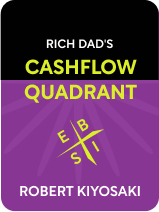

This article is an excerpt from the Shortform book guide to "Rich Dad's Cashflow Quadrant" by Robert T. Kiyosaki. Shortform has the world's best summaries and analyses of books you should be reading.
Like this article? Sign up for a free trial here .
Is there such a thing as ethical wealth? In other words, do you think it’s moral to strive to be wealthy?
Some people argue that wanting wealth and taking part in our capitalist system is immoral. According to financial educator Robert Kiyosaki, wealth is just a means to an end, the end being the freedom to do what you want with your time. While the means by which wealth is acquired can be immoral, wanting wealth in itself is not—no one can be blamed for wanting freedom.
Here is why it’s good to want wealth, according to Kiyosaki.
Robert Kiyosaki: It’s Good to Want Wealth
Kiyosaki says there’s no shame in wanting to be rich. For one thing, he says, more wealth means more freedom, and no one can be blamed for wanting freedom.
While Kiyosaki allows that our system has significant flaws that create inequality, he says it’s easier to beat the system by generating wealth than it is to change the system to make it fairer. There are many reasons Kiyosaki thinks ethical wealth accumulation is actually good:
- Kiyosaki says there’s nothing particularly moral about being beholden to a job you hate, lack of funds, or debt.
- Because learning to generate wealth requires delayed gratification and living below your means, trying to become rich will teach you financial self-control.
- In fact, he says that by not striving at least for financial security, you set a bad example for your kids, who will inherit your attitude toward money.
- Kiyosaki argues that generating massive amounts of wealth is actually generous.
Trickle-Down Economics and the Morality of Wealth
Kiyosaki isn’t alone in asserting that accumulating wealth is a moral imperative. This belief is in line with the conservative theory of trickle-down economics. Trickle-down theory posits that the ownership class creates jobs for the middle and lower classes and therefore should be rewarded with lower taxes and less regulation.
Critics of trickle-down economics attribute it to growing income inequality. Instead of creating jobs, they say, giving benefits to the already-rich just makes them richer and deprives everyone else of resources they need. A 2020 London School of Economics study found that over 50 years in 18 wealthy countries, tax cuts mostly benefited the rich and had little effect on unemployment or economic growth. Many economists say tax cuts for the lower and middle classes are better for the economy.
While accumulating wealth may help you get out of debt, develop self-control, and teach your kids how to save, it’s unclear that the mere fact of having wealth is a moral good.

———End of Preview———
Like what you just read? Read the rest of the world's best book summary and analysis of Robert T. Kiyosaki's "Rich Dad's Cashflow Quadrant" at Shortform .
Here's what you'll find in our full Rich Dad's Cashflow Quadrant summary :
- Why the traditional path of college to career doesn't work
- Which types of income will lead you to financial freedom
- An in-depth look at Robert Kiyosaki's four cashflow quadrants






